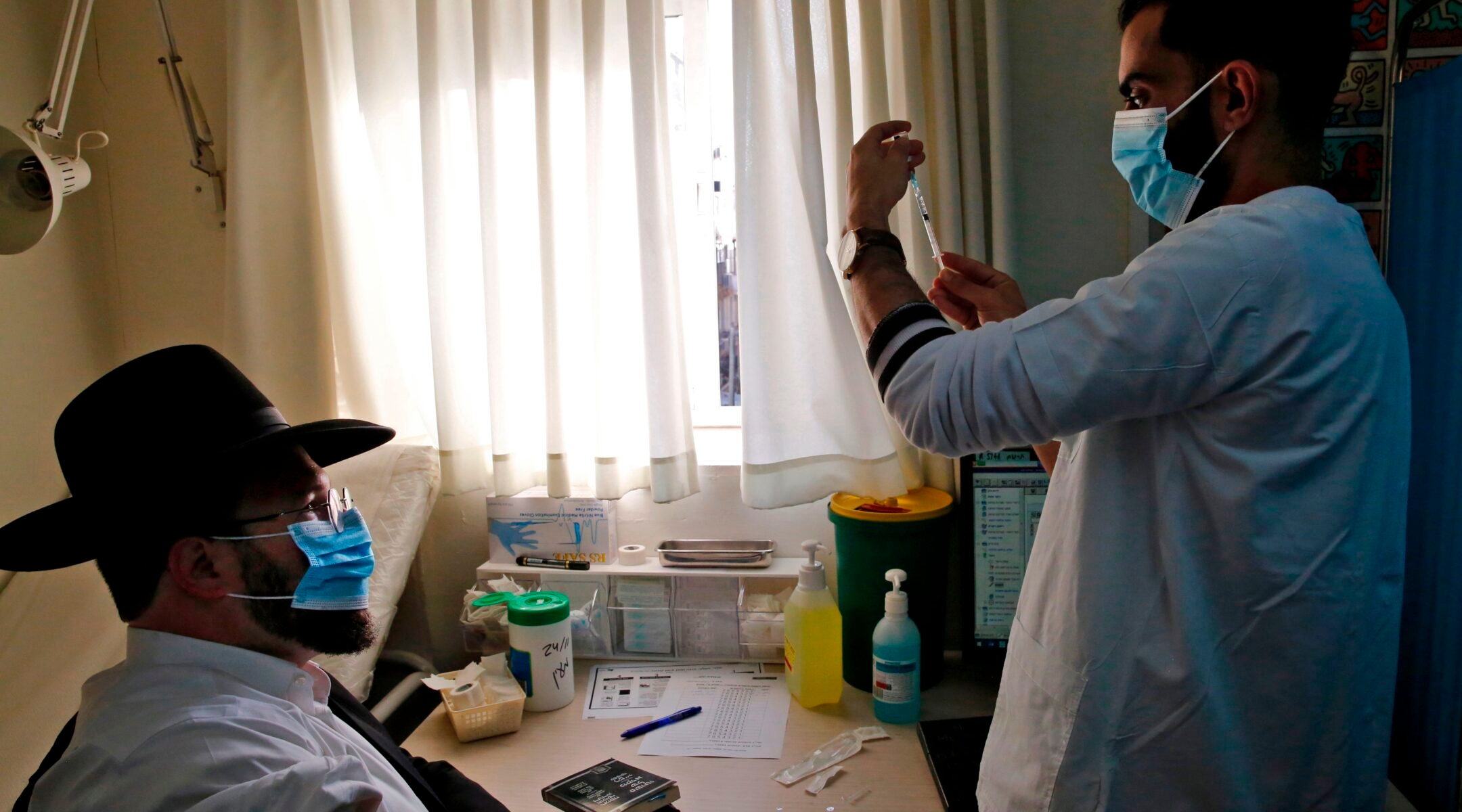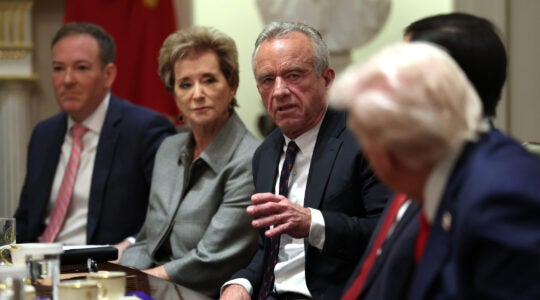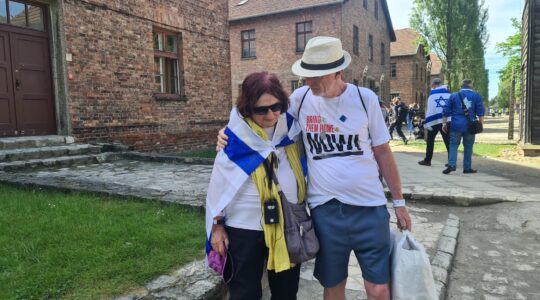(JTA) — At the beginning of his weekly video Torah lesson, Rabbi Asher Weiss let his viewers know he was about to broach a contentious topic.
“I know that not everybody will like what I say,” said Weiss, a leading Orthodox Jewish legal authority in Israel with a large following in the United States, peppering Hebrew terms into his speech. “But if I won’t speak my mind I think it would be a sin.”
The sensitive subject of his lesson?
The COVID-19 vaccine. After an hourlong class packed with rabbinic sources, Weiss gave his verdict: “When we deal with the question [of whether] to take the vaccine: Yes. Definitely yes.
“Every new medicine or medical procedure might have long-term effects, but we always try to strike the right balance between what is needed now and what might, theoretically, happen in the future,” he said. “People are dying, people are suffering, and we could alleviate this pain, and diminish the suffering and save many people. This is a safe vaccine as far as we could know.”
Weiss’ lesson echoes what medical and rabbinic authorities across the Orthodox world are saying as the COVID-19 vaccine begins to become available. Virtually all Orthodox leaders are encouraging their communities to trust the medical consensus and take the vaccine when it becomes available, and in Israel, many are already publicly sharing their own vaccinations.
Yet Orthodox health professionals and communal leaders do worry that a vocal minority of their community won’t heed their guidance. They point to skepticism regarding the vaccine in the overall population because of anti-vaccine sentiments — in the past expressed by some leading Orthodox rabbis — as well as nervousness with the speed at which the vaccines were developed and the politicization of the virus.
They also point to the pernicious effects of misinformation in an era when communication and newsgathering takes place on messaging networks like WhatsApp. And they fear that mistaken notions that Hasidim in both Brooklyn and the haredi town of Bnei Brak in Israel have achieved herd immunity will make people feel that a vaccine is unnecessary.
“The majority have [said], ‘How do I get on the list?'” said Rabbi Dr. Aaron Glatt, the chief of infectious diseases and hospital epidemiologist at Mount Sinai South Nassau on Long Island, and an assistant rabbi at the Young Israel of Woodmere, a large Orthodox synagogue. Glatt gives a weekly COVID video update targeted to a largely Orthodox audience.
“A significant minority have reasonable, legitimate concerns about the vaccine, and this is even seen in younger health care professionals,” he added. “Then you have a very small but vocal group that will not take the vaccine, no matter what. There’s no way to convince them. I can’t convince them and I hope God protects them.”
That small but vocal group has included in the past some leading Orthodox rabbis who have called vaccines a “hoax,” including prior to recent measles outbreaks in Brooklyn and Israel. So when a pashkevil, a flyer commonly used to publicize rabbinic opinions on communal issues, appeared earlier last month suggesting that several well-known rabbis opposed the COVID vaccine, it was hard to tell whether it was real.
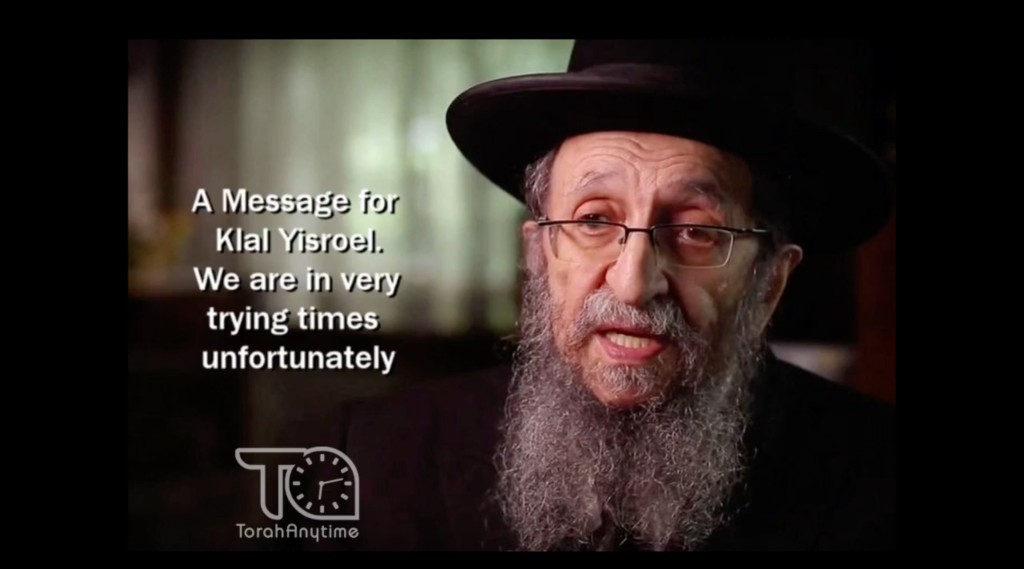
Rabbi Shmuel Kamenetsky, shown endorsing President Trump for reelection, said a widely circulated flyer with his name opposing the COVID vaccine was forged. The rabbi said he would not take a position on the vaccine. (Screenshot from YouTube)
In fact, the flyer was forged, according to one rabbi named on it. The flyer claimed that Rabbis Shmuel Kamenetsky and Malkiel Kotler, two well-known anti-vaccine and major Orthodox leaders, were among a group of rabbinic leaders opposing the soon-to-be-distributed vaccine. (Kamenetsky also endorsed Donald Trump for president earlier this year.) The flyer circulated widely online, prompting Kamenetzky to issue a statement saying it was not real. But he also did not promote the vaccine — instead, he said, he would not take a position on the matter.
Glatt said a major driver of vaccine skepticism among Orthodox Jews is distrust of government, which he said stemmed from a long history of anti-Semitic policies in Europe. But Glatt said that fear was misplaced in the United States.
“Experimenting on Jewish people is something the Nazis were only too willing to do, so there is a certain hesitancy to work with governments,” he said, adding however that the U.S. government is “interested in the welfare of the Jewish people. They’re not out to hurt us.”
Relations between the state and local governments and parts of the Brooklyn haredi, or ultra-Orthodox, population have been especially strained by months of disputes over COVID-19 restrictions.
When COVID cases started rising again in Brooklyn’s Hasidic neighborhoods a few months ago, the state and city began restricting activity, sparking street protests among a group of haredi residents who objected to the mandates and burned masks in the streets. New York City Mayor Bill de Blasio and New York Gov. Andrew Cuomo have also called out large gatherings of Orthodox Jews for weddings and funerals, prompting accusations that they were singling out Jews for blame.
Blimi Marcus, a nurse practitioner in the Hasidic neighborhood of Borough Park, said the best way for government officials to reach haredi Jews is to direct advocacy and education through organizations they trust. Marcus said she has yet to see the city and state taking meaningful steps in that regard.
“They need to give the community, and community leaders and community organizations, resources to start informing the community about the safe profile” of the vaccine, she said, pointing to organizations like Hatzalah, the Jewish ambulance corps, and Chai Lifeline, which provides services for children with serious illnesses, as groups that would be able to convince many Orthodox Jews to embrace vaccination.
“There are a lot of community organizations that hold a lot of trust, and public support by these organizations could probably go a long way,” said Marcus, who has been posting pictures of Orthodox nurses getting their vaccines on Twitter since the shots first became available in the United States last week.
Israeli leaders are contending with survey data suggesting that 40% of haredi Orthodox Jews were not eager to be vaccinated early. (Vaccine skepticism is much lower among secular Jews but higher among Israeli Arabs, according to the survey data.) Last week, following days of talks with Israeli health officials, several leading haredi rabbis endorsed the use of newly developed COVID-19 vaccines.
That effort already is yielding high-profile results, as past and present chief rabbis and the mayor of Bnei Brak, a haredi town, were vaccinated on Sunday. (Any Israeli in high-risk groups or over age 60 can already sign up to get the vaccine, in addition to front-line workers.)
“You must not be afraid,” said one of the former chief rabbis, Yisrael Meir Lau, according to Israeli journalist Noga Tarnopolsky. “Vaccination is an obligation for all of us.”
Orthodox leaders in New York are also worried about the role that misinformation may play in discouraging Orthodox Jews from lining up for the vaccine. The experience of the New York City measles outbreak last year, the epicenter of which was in Brooklyn’s Orthodox neighborhoods, provides a cautionary tale. There, too, misinformation and skepticism of experts played a role in low vaccination rates in Hasidic neighborhoods.
In a video message posted earlier this month, Dr. Stuart Ditchek, an Orthodox pediatrician in Brooklyn who, like Glatt, has offered frequent updates on COVID-19 research and treatments throughout the pandemic targeted to an Orthodox audience, warned people away from getting their medical information from social media or messaging apps like WhatsApp, which is popular with haredim.
“The best thing we can do is to crush the misinformation mill,” Ditchek said. “Don’t believe a headline because it appears on a website. Don’t believe a WhatsApp video because somebody put it out.”
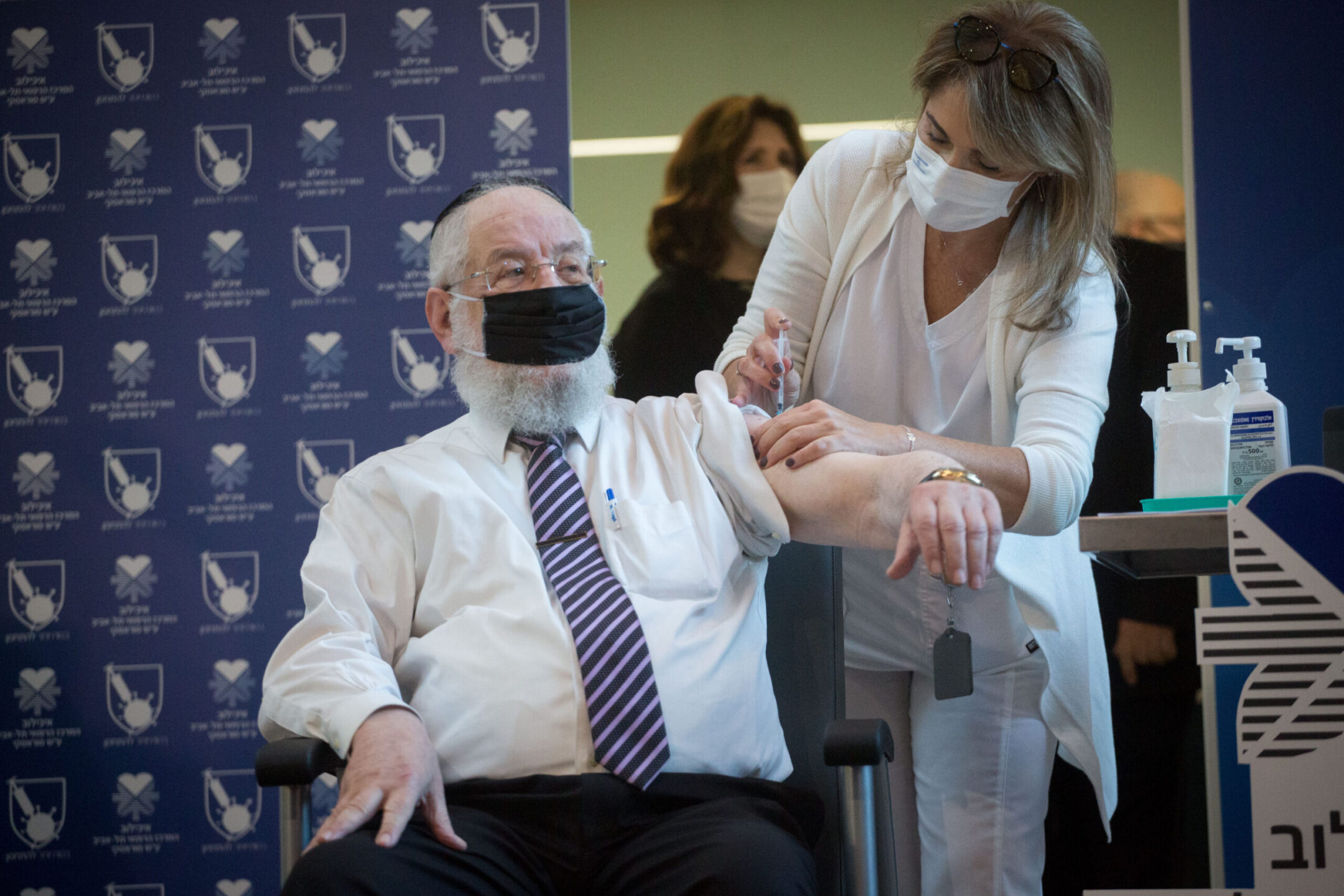
Rabbi Yisrael Meir Lau receives a COVID-19 vaccine at Tel Aviv Sourasky Medical Center (Ichilov), Dec. 20, 2020. (Miriam Alster/Flash90)
Orthodox leaders said the anti-vaccination movement among Orthodox Jews mirrors a parallel problem in society at large. According to the Kaiser Family Foundation, the percentage of Americans willing to take a COVID vaccine is rising. But 27% still said they probably or definitely wouldn’t get the vaccine.
“In general the pattern in the frum [or observant] community follows the approach in the mainstream community, so in the general, mainstream community, there’s a lot of concern about the vaccine, the speed of how it was developed and concerns about how safe it is, concerns about effects arriving later,” Marcus said. “The only additional concern that I would see is that people might think they already have immunity.”
The idea that Brooklyn’s Hasidic Jews may have herd immunity spread over the summer, when previously skyrocketing rates of COVID dropped and the community stopped seeing many new cases even though people relaxed their social distancing measures. Medical experts, however, disputed the idea that the communities had achieved herd immunity — and even when herd immunity is achieved, individuals without previous infection remain susceptible if they do encounter the virus.
Now as the vaccine starts to roll out, rabbis and doctors like Glatt and Ditchek, as well as authorities like Weiss, are encouraging their followers to vaccinate when it becomes possible. And the Center for Disease Control said even those who have recovered from COVID-19 and have some naturally acquired immunity may benefit from the vaccine.
Late last week, the Orthodox Union, an umbrella organization, put out a document endorsed by Orthodox Jewish legal authorities urging Orthodox Jews to vaccinate.
“It is not a task that we are undertaking to try to convince the anti-vaccine movement,” said Rabbi Moshe Hauer, the O.U.’s executive vice president. “We’re not going to expend efforts to change their mind. We’re going to do positive education to the vast, vast majority of our community that seeks solid, grounded public health guidance.”
Traditionally, Glatt said, Orthodox Jews place significant stock in the guidance of their rabbis, and he said that practically every Orthodox leader has come out in favor of a vaccine. He said the idea that people should research vaccines and trust their own judgment above all else comes from influences outside the community.
“It’s the secular influence on society, that there is no more authority,” he said. “Everyone decides from Google, everyone decides from the internet. There’s no longer an authority that everyone respects because everyone has a soapbox to get on.”
Glatt added, “People have to realize that what they’re doing does not only impact them, it impacts the community.”
JTA has documented Jewish history in real-time for over a century. Keep our journalism strong by joining us in supporting independent, award-winning reporting.
